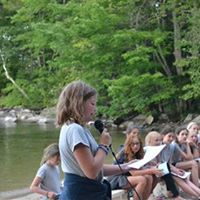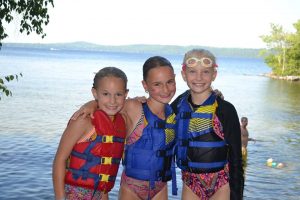From an early age children are developing skills that will help them to be independent of their caregivers. Adults work hard to provide physically and emotionally safe spaces for children to have the opportunity to develop their confidence and the skills that they will need to live independently. When children are small it may be parents and caregivers spend time teaching basic skills. Some skills are instinctive like feeding themselves and learning to walk while others required direction and input from older humans. Learning the alphabet, reading, tying your shoe laces and riding a bike may all take a while to master. Children begin to learn the boundaries of their own capabilities and to feel more confident in the world around them. As their world grows so does their need for the skill of being more independent. Camp can play an important role in developing more independence than other more restrictive opportunities.
While parents are initially a child’s primary resource, school and extracurricular activities provide for the academic development of our kids and are supplemented by experiences with our extended families and in the community.
In our house it’s kind of a family joke about ‘life skills training’ especially when I am asking the kids to do chores or be helpful. Some skills are ‘advanced’ and not able to be mastered yet and all need a growth mind set to learn. These ‘life skills’ certainly have equal value to academic skills.

How do kids develop independence? They certainly can’t do it if every minute of their day is managed by adults. For some kids even ‘free play’ time is on the schedule and actively supervised with adults intervening if conflict or upset arises. We have to provide kids with the time and space to do their own thing.
At camp a simple way that we develop independence is by offering choices. Supported by caring adults and within the structure and routine of the camp day, campers choose activities, the food they eat, what to do in free time, who to hang out with and the clothes they are going to wear.
From the youngest age groups, girls manage their belongings, navigate around camp, make choices about what they will do or not do, figure out what they want to eat and develop relationships without constraints. It’s great that you don’t need to schedule a time or have a ride if you want a play date there is a diverse array of people to connect with.

The multi-age structure at camp allows girls to develop where their skill level is at. We know that not everyone gains the same skills at the same speed or age so camp allows for a variety of ages and abilities to be working alongside each other. Girls are ready for camp at different ages too, Parenting Magazine has a great article about determining if your child is ready for a sleep away camp experience.
Of course at Runoia there is structure and support in place to help girls feel confident in their decision making. Camp Runoia’s, Harmony Land Camp program is specifically designed for younger campers who are away from home for the first time. Directed by seasoned camp counselors who are skilled adults that are educators this age appropriate program has realistic expectations and provides these young campers with an introduction to the Runoia experience. Girls spend time with their group as well as integrating with main camp. They have the opportunity to be more independent than they may get to be at home or school and often leave ready and determined to do a full session the following year.
We can’t wait for June and toe be together on the shores of Great Pond.

